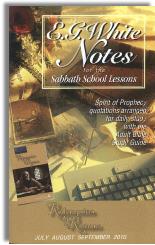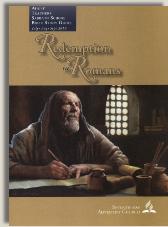|
||||||||||||||
Commentary on "Victory Over Sin"
Day 1: Sabbath Afternoon, August 14, 2010 - Introduction
Overview
This week’s lesson opens with the controversy over Romans 7. Is the man speaking in this chapter, describing his great struggle over sin, a Christian? Ellen White stated (in The SDA Bible Commentary) that the conflict described in Romans 7 is experienced by “every soul confronted by and awakened to the spiritual claims of God’s holy law.” Mrs. White believed that Paul was writing about his experience before his conversion, of trying to meet the law’s demands.
The lesson does not immediately take a position on Paul’s new birth in Romans 7, but states that what is most important about this chapter is not whether Paul was speaking of his life as a converted man, but that we stand perfect before God in Jesus’ righteousness. He promises to sanctify us and give us victory over sin. That is what is critical to know as we spread the gospel to the world.
Observations
An overwhelming commitment to the Ten Commandments has always stood out in Adventist interpretations of scripture. Preservation of law-keeping is a priority, especially in this chapter of Romans where Paul appears to find weakness in the law. That is why this lesson will not deal directly with Paul’s line of argument, but prefers to talk about controversy.
Romans 7 was not written in an obscure, spiritual code. The Bible is accessible to all Christians when we take its words at face value. We can approach Romans 7 in a “normal” way, confident that the real meaning is not hidden from us, or that someone with greater intellectual or spiritual gifts must interpret it for us. A vital principle of the Reformation held that with the aid of the Holy Spirit, Scripture will explain itself. Instead of injecting our own priorities into the words of Romans 7, we can understand what Paul really meant to say.
Throughout the chapter, Paul refers to himself as “I,” writing about his own experience with the law and sin. So when Paul said “I do the very thing I hate,” he was referring to himself, in the present. That is the normal reading of those words. Paul, the great apostle wanted to tell us that for him, sin was a continuing struggle. His rebellious flesh warred against his willing mind, so that he could not do what he wanted. In a similar way, he tells the Galatians,
For the desires of the flesh are against the Spirit, and the desires of the Spirit are against the flesh, for these are opposed to each other, to keep you from doing the things you want to do (Galatians 5:17).
This can only describe Christians who have the Spirit indwelling them and opposing their fleshly desires. Certainly it is reasonable to ask, how can a Christian experience such an internal contradiction, admitting failure, and still be a follower of Christ who gave the law? Doesn’t the new birth bring us new power to fulfill the law? Ellen White resolved the dilemma by stating that the narrator is either an unconverted man, or an unsuccessful Christian who has not yet discovered victorious living.
The lesson also assumes that “dying to the law” must refer to only a certain part of the law, the Jewish worship system known as the “ceremonial law.” We’re then obligated to dissect the law to figure out just what parts of the law we are to die to. That is no simple task.
If the struggling man of Romans 7 is a born-again Christian who has died to the whole law of Sinai, then everything we read in the book of Romans will look different. Fulfilling the law and dying to it will both become a beautiful reality in our lives without appearing as a contradiction. As we look at this important chapter, our overwhelming commitment will be to find what the scripture, by the Holy Spirit, actually can say to us.
Summary
- This lesson’s primary goal is to uphold the law as a guide to holiness for Christians.
- Ordinary people, with the Holy Spirit, can read and understand the man of Romans 7.
- A plain reading of this chapter reveals that Paul is writing about himself in the present.
- Understanding our death to the law will free us to understand what the scripture really teaches about the law and our true identities.
Copyright 2010 BibleStudiesForAdventists.com. All rights reserved. Revised August 12, 2010. This website is published by Life Assurance Ministries, Glendale, Arizona, USA, the publisher of Proclamation! Magazine. Contact email: BibleStudiesForAdventists@gmail.com.
The Sabbath School Bible Study Guide and the corresponding E.G. White Notes are published by Pacific Press Publishing Association, which is owned and operated by the Seventh-day Adventist church. The current quarter's editions are pictured above.
Official Adventist Resources
Standard Edition Study Guide Week 8
Teacher's Edition Study Guide Week 8
Easy Reading Edition Study Guide Wk 8
Search the Complete Published Ellen G. White Writings


